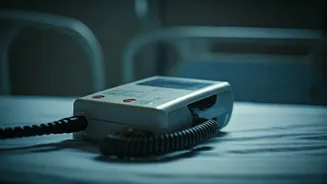Recognize the Signs
The first step is recognizing the symptoms. Chest pain, often described as a squeezing, pressure, or tightness, is the most common sign. This pain can
radiate to the arms, shoulders, neck, jaw, or back. Other symptoms include shortness of breath, sweating, nausea, lightheadedness, and a feeling of impending doom. These symptoms can vary from person to person, and some people, especially women, may experience atypical symptoms like fatigue or abdominal pain. It's crucial not to dismiss any of these symptoms as minor. The faster you identify the problem, the better the chances of survival. If you experience these symptoms, do not delay, immediate action is needed.
Call for Help Immediately
The most important thing to do is to call for emergency medical help. Dial your local emergency number (like 108 in India) without delay. State clearly that you are having chest pain or suspect a heart attack and provide your location. Do not try to drive yourself to the hospital, as you could lose consciousness and cause an accident. Stay on the phone with the dispatcher, as they can provide guidance until help arrives. They might even be able to guide you on what to do. Providing as much information as possible to the dispatcher is important, it will allow them to assist you faster.
Chew an Aspirin
If you are not allergic to aspirin and have no other contraindications, chew and swallow a full-strength (325 mg) aspirin tablet. Aspirin helps to thin the blood, allowing blood to flow through a narrowed artery, hopefully reducing the damage. Do this immediately after calling for help. If you don't have aspirin on hand, do not waste time looking for it; focus on getting help. If you've had an allergic reaction to aspirin in the past, or have a condition where aspirin isn't advised, skip this step. Always follow the instructions of the emergency responders, or the medical staff on the phone with you.
Stay Calm and Still
Panic can make the situation worse. Try to remain calm and stay as still as possible. Find a comfortable position, ideally sitting down, to minimize the strain on your heart. Avoid any unnecessary movement, such as getting up to open the door for emergency services. Take slow, deep breaths to help manage your anxiety. The deep breaths help to maintain oxygen levels and can help calm you down. Waiting for help can seem like a lifetime, but staying calm is important. Focus on remaining still and breathing steadily. Do not overexert yourself in any way during the wait.
Prepare for Arrival
While waiting, unlock your doors to allow paramedics easier access, if you can. Make sure the pathway to your door is clear. This can save precious time when they arrive. If you have any relevant medical information, such as a list of medications, or allergies, have it readily available to give to the paramedics when they arrive. If you have any known heart conditions, make sure the responders know this information immediately. If you are aware of any medical directives, like a living will, have that information available. This information will help the medical team offer better and faster support.
Follow Medical Guidance
Once the paramedics arrive, follow their instructions carefully. They may administer medications, such as nitroglycerin, to help open up your arteries, and provide further medical care. They will also monitor your vital signs and provide any necessary treatments. The medical team will assess your condition and provide the required care. They'll transport you to a hospital for further evaluation and treatment. Be open and honest with the medical team about your symptoms, and medical history, so that they can give you the best possible care. Trust in their training and experience to get you the best chance of recovery.













